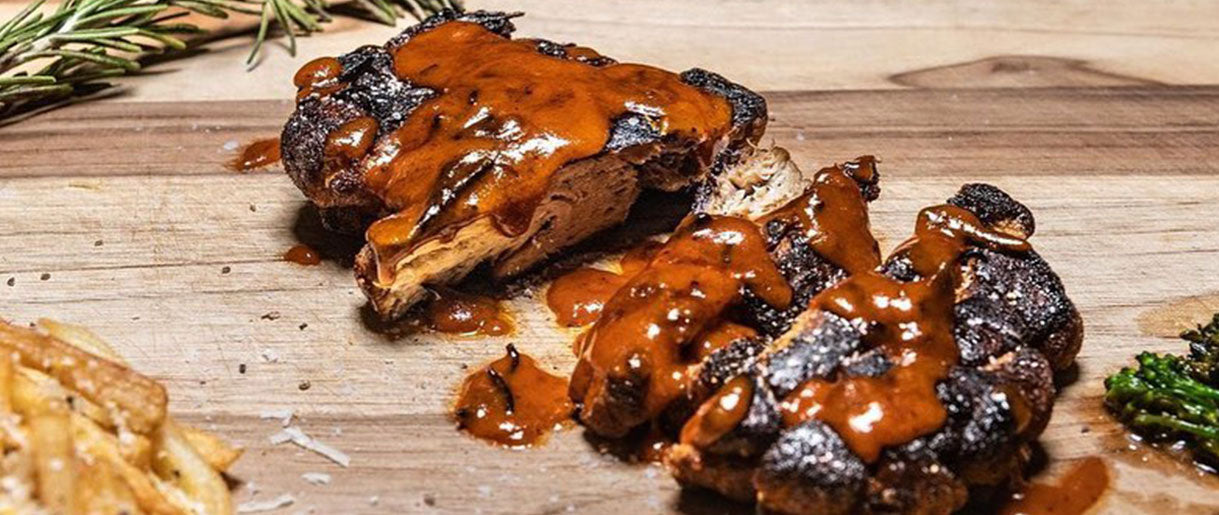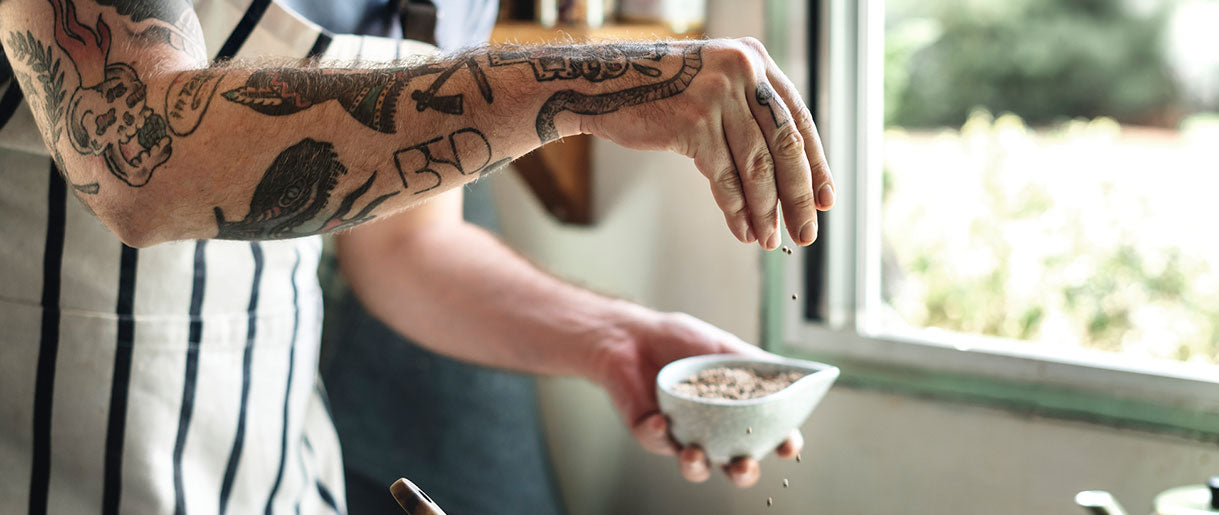In the bustling world of wellness trends, it's easy to overlook the quiet yet potent revolution mushroom powder is stirring. Picture this: a magical powder that slips unnoticed into your meals, infusing them with a powerhouse of nutrients that work wonders for your body and mind.
Incorporating it into your daily routine is as easy as sprinkling fairy dust—just a teaspoon swirled into your morning smoothie or acomforting cup of tea can elevate your wellness journey to heights you've never imagined.
As we venture further, we will unveil more delightful ways to embrace this superfood, weaving it seamlessly into your meals and snacks, unveiling recipes that not only tantalize your taste buds but also nourish your soul.
And it doesn't stop at the palate; we will explore how this wonder powder can be a beacon of radiance for your skin, a catalyst for mental clarity, and a fortress for your immune system.
Ready to unlock the secrets that have been cherished through centuries?
Stay with us as we step into the enchanting world of mushroom powder, where well-being meets delectable flavors and your journey to holistic health is sprinkled with moments of culinary delight.
Let's dive in!
The Magical World of Mushrooms

The ever-changing realm of health and wellness often has us rediscovering what ancient civilizations have known for centuries.
Tapping into the ancient roots of medicinal mushrooms, we find a reservoir of secrets that modern science is eager to unveil.
In various cultures, these fungi were not just a food source but revered as a potent medicine, a testament to their vast health benefits.
A Brief History: The Ancient Roots of Medicinal Mushrooms

Long before the advent of modern medicine, different cultures revered the power and potential housed within medicinal mushrooms.
In traditional Chinese medicine and many other ancient practices, these fungi were known to be a source of vitality and longevity.
Transforming fresh mushrooms into dehydrated mushrooms preserved them for prolonged use and concentrated their beneficial properties.
Types of Mushrooms That Are Commonly Used to Make Powder

When creating homemade mushroom powder, there are many choices, each boasting its unique profile of nutrients and benefits. Let's delve into a few popular options:
- Reishi: Known as the mushroom of immortality, it's a favorite among functional mushrooms, famous for its immune-boosting properties.
- Cordyceps: Often found in mushroom powder blends, this type is known for enhancing physical performance and fighting fatigue.
- Lion's Mane: A superstar in the realm of functional mushrooms, renowned for its potential to enhance cognitive function and mental clarity.
- Shiitake Mushrooms: A delightful choice in both culinary and medicinal spheres, they house a rich nutrient profile that can enhance several aspects of your health.
Nutrient Profile: What Makes Mushroom Powder a Must-Have in Your Pantry

Transitioning from dried mushrooms to a fine powder allows for a convenient integration into various meals.
Mushroom powders, particularly in their powdered form, are dense with various vitamins, minerals, and antioxidants that can potentially revolutionize your health regimen.
When you include this nutrient-dense ingredient in your pantry, you add a culinary asset and a wellspring of health advantages.
Why Mushroom Powder?
The transition from dried mushrooms to finely ground mushroom powders has opened up a new dimension in harnessing the health benefits of mushrooms.
But why exactly should you welcome mushroom powder into your life? Let's delve into the compelling reasons:
Boosting Immunity: The Natural Shield Your Body Needs

Fortifying your immune system is more crucial now than ever.
The potential health benefits housed within various mushroom species offer a robust defense mechanism, enhancing immune system function through a wealth of beneficial compounds.
These compounds, often found in varying mushroom powders, act as nature's shield, offering a fortified defense mechanism your body ardently needs.
Mental Clarity: How It Can Enhance Cognitive Functions

Navigating the modern world requires a sharp mind and a clear focus.
Interestingly, the health benefits of mushrooms don't stop at boosting your physical well-being. Some mushrooms promote brain health and enhance mental clarity—a good example is Lion's mane, which fights brain fog.
Rich in B vitamins and other vital nutrients, incorporating mushroom powder into your diet can be a game-changer in nurturing a healthy, functioning mind.
Mushroom Powder for Skin and Beauty: Unlocking a Natural Glow

Beauty isn't just skin deep, especially when the secrets housed in mushroom powders can assist you in unlocking a natural, radiant glow.
While the mushroom powder taste might be a nuanced addition to your culinary adventures, the compounds these mushrooms impart go beyond mere flavor, promising a rejuvenated complexion and a glow from within.
Imagine walking into a room with a glow that tells tales of nourishment and natural care. This isn't just a beauty regimen but a revolution, paving the way to showcase mushrooms' profound health benefits in enhancing your beauty and overall well-being.
Getting Started with Mushroom Powder

As we journey deeper into the fascinating world of mushroom powders, it becomes evident that embracing this wondrous ingredient can be both delightful and transformative.
But how does one get started?
We've got you covered, from picking the right product to making your own mushroom powder. Let's explore:
Choosing the Right Mushroom Powder: Tips to Buy the Best Product

Entering the mushroom powder market can initially seem overwhelming, given the many options available. Here, we aim to guide you in making informed choices.
Be it figuring out how to use reishi mushroom powder or how to use lion's mane mushroom powder; it's essential to choose products that align with your health goals and culinary preferences.
While scouting for the perfect match, consider the mushroom flavor that appeals to you and whether you want a savory flavor to enhance your dishes or a more nuanced profile that complements desserts and smoothies.
Easy DIY: Making Mushroom Powder at Home

Creating a batch of homemade mushroom powder can be fulfilling for those who prefer a hands-on approach. Here is a guide on how to prepare mushroom powder at home:
Step #1: Gathering Ingredients
To retain maximum nutrient density, start with fresh or cooked mushrooms, preferably organic.
Step #2: Drying Process
To grind your mushrooms and turn them into powder, you have to dry them. Allow them to dry in the sun before moving on to the next step—grinding.
Step #4: Grinding
Once dried, grind the mushrooms into a fine consistency, ready to be used as a delightful mushroom powder seasoning.
Step #5: Utilization
Wondering how much mushroom powder to use in your recipes? It largely depends on your personal preference and the intensity of flavor you desire. Here's a simple guideline on how to use mushroom powder in cooking:
When adding mushroom powders to your meals, start with a small amount and adjust according to taste and preference, allowing a seamless integration into your culinary adventures.
How to Use Mushroom Powder Like a Pro
Discovering the myriad ways to incorporate mushroom powder into your daily regimen can be a culinary adventure.
Whether sprinkling the mushroom powder into your morning smoothies or enhancing your favorite meals, the versatility of mushroom powder knows no bounds.
Here, we're offering a few ideas to make you adept at using mushroom powder like a seasoned chef:
Sprinkling into Smoothies: A Recipe for a Nutrient-Packed Start to Your Day

Imagine starting your day with a burst of nutrients that fuel your body and mind. Here's a simple smoothie recipe to try:
1. A handful of mixed berries
2. A scoop of Lion's mane powder
3. A teaspoon of lemon juice
4. A touch of freshly cracked pepper to enhance the flavor profile
5. Blend all the ingredients until smooth using a food processor
6. Voila! A nutrient-dense smoothie, rich in essential amino acids, is ready to kickstart your day with vigor and vitality.
Enhancing Meals: Ideas to Incorporate Mushroom Powder into Various Cuisines

Adding a dash of mushroom powder can elevate many mushroom dishes, adding depth and complexity to the flavor profile. Here are a few culinary inspirations to explore:
- Sprinkle some on scrambled eggs for a hearty breakfast
- Incorporate it into a stir fry for an umami boost
- Enhance your soups with a spoonful, pairing perfectly with a vegetable broth
- Even baked goods can benefit from the rich, earthy flavor and taste of mushroom powders.
Brewing a Comforting Cup of Mushroom Tea: A Step-by-Step Guide

Tea lovers, rejoice!
Brewing a cup of mushroom tea can be a comforting experience, offering a fantastic way to enjoy the benefits of mushroom powders.
Add a teaspoon of Lion's mane powder into a cup of hot water, stir well, and enjoy a serene moment with a cup of mushroom goodness.
Recipes and Inspirations

Embracing the mushroom powder revolution in your kitchen enhances your meals' nutrient profile and brings a gourmet touch to your everyday recipes.
Suppose you've been pondering how to use mushroom powder to its fullest potential. In that case, we're here with some delightful recipes and inspirations to satiate your curiosity and taste buds.
Here we go:
Mushroom Powder Infused Breakfast Bowl

1. In a pan over medium heat, sauté your favorite vegetables with a hint of garlic and olive oil.
2. Sprinkle a reasonable amount of mushroom powder (if you are unsure how much mushroom powder to use, start with half a teaspoon and adjust according to taste) and toss well to coat the veggies evenly.
3. Serve the sautéed vegetables over a bowl of quinoa or rice, making a fulfilling meal rich in plant-based protein.
Evening Snack: Mushroom Powder Dusted Popcorn

1. Prepare a batch of popcorn according to your preferred method.
2. While still hot, sprinkle a blend of turkey tail mushroom powder and a pinch of salt over the top.
3. Toss well to ensure an even coating, and enjoy a tasty and nourishing snack.
How to Brew a Soothing Cup with Reishi Mushroom Powder

Looking to relax with a cup of something warm and nourishing? Here's a quick guide on how to use reishi mushroom powder in your hot drinks:
1. Add a teaspoon of reishi mushroom powder to your favorite herbal tea or hot cocoa in a cup.
2. Stir well to dissolve the powder completely.
3. Enjoy a comforting cup filled with the wholesome goodness of mushrooms, perfect for unwinding after a long day.
FAQs on How to Use Mushroom Powder
What Are Mushroom Powders Good For?
Mushroom powders are renowned for their impressive health benefits, often utilized to enhance immune system function and boost overall well-being.
Rich in essential nutrients, including B vitamins and beneficial compounds, they can easily be incorporated into various meals and drinks to elevate flavor and nutrition.
Moreover, they've been found to potentially support cognitive functions and skin health, making them a versatile addition to a health-conscious diet.
How Much Mushroom Powder Per Day?
The optimal daily dosage of mushroom powder can vary based on individual health goals and the type used. Generally, a daily intake of 1-2 teaspoons is considered safe and sufficient to reap the potential health benefits.
It's always best to start with a smaller amount and adjust according to personal preference and tolerance, and consulting with a healthcare provider for personalized advice is recommended.
Is Mushroom Powder A Probiotic?
The mushroom powder is not classified as a probiotic but falls under the superfood category, offering a rich source of nutrients, vitamins, and minerals.
While it doesn't contain the beneficial bacteria found in probiotics, it can still support a healthy digestive system, thanks to its fiber content and other beneficial compounds.
Incorporating mushroom powder into your diet can complement a regimen that includes probiotics, enhancing overall gut health and immunity.
Key Takeaways
As we explore the versatile world of mushroom powders, it's clear that this natural powerhouse is more than just a culinary delight.
Not only have you discovered their deep roots in ancient medicine, but you've also unraveled the secret to effortlessly boosting your daily nutrient intake. The potential benefits are vast and exciting, from enhancing your immunity to adding a gourmet touch to your meals.
Now, armed with a trove of ideas, from revitalizing morning smoothies to a comforting cup of mushroom tea, you're all set to revolutionize your meals with a sprinkle of this fine powder.
Now, it's your turn to dive in and experience the transformative power of mushroom powders firsthand. So why wait? Start experimenting with these potent powders in your recipes today!
And as you do, we'd love to hear about your adventures in the kitchen. Share your favorite recipes and experiences in the comments below—your insights could be the spark that inspires others to embrace the mushroom powder revolution!










Let Us Know Your Comments